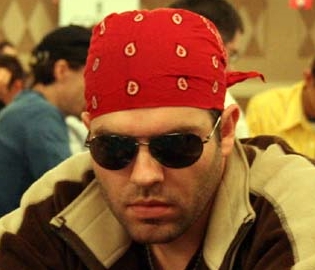
Last year, I had the opportunity to speak with then two-time World Series of Poker bracelet winner Dutch Boyd (he would pick up his third during this summer’s retreat to the Rio in Las Vegas) regarding a book that he was in the process of writing. At the time, Boyd stated that the book would be “part strategy, part life discussion of the world of poker.” He was planning to release the book prior to the start of the 2013 WSOP but, along with co-author Lawrence Samuels, decided to put it off for a year to fine-tune the effort; that time was well worth it.
Boyd’s Poker Tilt (available on Amazon.com in paperback for $22.49) was released prior to the start of the 2014 WSOP and isn’t quite the book that he envisioned in 2013. The “poker strategy” that Boyd was looking to put in the tome has pretty much disappeared, but what he and Samuels have come up with is an extensive autobiography of one of the most polarizing poker players of the past decade. Boyd doesn’t dodge away from the controversies in any way, giving the reader the opportunity to make their own decisions.
To start the book, Boyd delves into what – for some – would be a disastrous moment. Reliving his run in the 2003 WSOP Championship Event, Boyd discusses his thought process in going up against eventual champion Chris Moneymaker in a hand that would eventually cripple Boyd on his run to twelfth place in the tournament. But we don’t reach that denouement this early…instead, we join Boyd on a discussion of his life over the span of 275 pages.
Boyd’s life is interesting enough that, once I began reading the book, I became less concerned that there wasn’t a great deal of poker strategy content. At the tender age of 12, Boyd would test out of high school and graduated college by the ripe old age of 15 before moving onto law school. In getting to that point, Boyd details out the familial issues that would have stunted any normal person. Things such as the divorce of his parents, several moves around the United States and a turbulent childhood, things that would also serve him well in the man he would become.
These life issues were harrowing enough, but Boyd actually delves into his adult life with an additional honesty that is brutal. He discusses the rise and fall of Pokerspot.com in depth, stating that it went under due to the same thing that would strike Full Tilt Poker nearly a decade later (shady payment processing not putting money through to the site). Boyd also recounts stories that show how Pokerspot affected his life through unscrupulous internet businesses (casinos) that looked to steal Boyd’s property from him.
Perhaps the hallmark of the book is Boyd’s discussions of his issues with bipolar disorder. Throughout the book there are bipolar breakdowns that Boyd talks about and he doesn’t shy away from the full details. The veils on hospital stays (or, worse yet, psychiatric wards), the cocktail of medicines that are tried until they fail and the general mental health community are all pulled back in Boyd’s words. It is a highly fascinating trip (one that I wouldn’t wish on anyone) and Boyd seems to have come out on the other side of the journey (for now) for the better.
Before you think that the book is an Oprah-ready weeper, Boyd does throw in some poker material also. He recounts the formation of The Crew (surprisingly wasn’t as organized as many thought), his relationships with other professional poker players and members of the community over the years, his trips around the world in chase of poker immortality and the winning of two WSOP bracelets. In reality, however, the book seems to be more of a catharsis for Boyd, who ends it in this manner talking about poker and, in effect, life itself:
“One day we won’t be here. Everything ends eventually. Our game (poker) is no exception. There will be a last bad beat, a last check-raise. There will be a last shuffle and a last hand dealt. There will be a last World Series of Poker.”
Although it isn’t the book that I thought he would come up with, Boyd’s Poker Tilt was much more enjoyable than a simple poker strategy how-to (there’s poker strategy in the book, but it isn’t blatant; you’ll have to pick up on it for yourself). Boyd wanted to emulate Barry Greenstein’s Ace on the River and he nearly equaled it as to the information between the pages and the value for the reader. Whatever your personal feelings are about Boyd, you’d be doing yourself a disservice by not taking the time to read Poker Tilt.
Now Dutch, let’s talk about that strategy book…


















